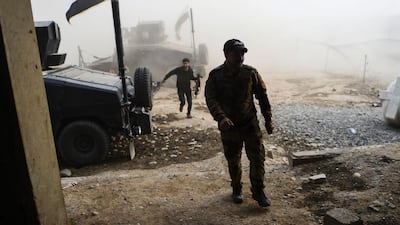BAZWAYA, IRAQ // It’s their city, their battle, their honour.
Iraq’s elite “Mosul Regiment” was the last out when the extremists overran the city, and now, they want to be the first back in.
Weeks into a huge offensive to take back the city seized by ISIL two years ago, their dreams appear to be closer to reality now as the Mosul Regiment on Monday began flushing out the extremists from the last two villages before the city’s eastern entrance.
June 10, 2014, at exactly 10.00am.
The moment is still etched in the mind of Lieutenant Colonel Muntadhar Salem, and righting that wrong has been an obsession of his ever since.
As the men from Iraq’s elite Counter-Terrorism Service (CTS) set off from Bartalla, a town they retook last week, they found themselves targeted with mortar fire by ISIL fighters.
Lt Col Salem did not blink as two rounds fell on either side of the building where he was posted and a third shaved it before ploughing into the ground farther away.
It was not until one of his medics was hit that the officer ran to the unfinished building where the wounded soldier was taken with shrapnel in his chest.
The medic was promptly evacuated and the Mosul Regiment continued its advance.
Lt Col Salem relentlessly called in co-ordinates to the US-led coalition, occasionally resulting in air strikes that sent huge mushrooms of dust into the sky.
Colonel Mustafa Al Obeidi’s voice came sputtering over the radio as his men advanced cautiously through the village of Bazwaya, sidling along walls and scanning the empty streets with their rifles raised: “They’re fleeing, the jihadists are fleeing into Mosul.”
The eastern side of Mosul, the city that is the extremists’ last major stronghold in Iraq and where their leader Abu Bakr Al Baghdadi proclaimed his “caliphate” two years ago, is expected to offer limited resistance.
Military sources and residents have for days reported that ISIL leaders were moving across to the west bank of the Tigris River that runs through Mosul.
Other forces — including soldiers, police and Kurdish peshmerga fighters — are advancing on other fronts, but have yet to approach the city limits.
When ISIL seized the city in June 2014, the Mosul Regiment was forced to vacate its Al Ghuzlani base.
“It was the prime minister, Nouri Al Maliki at the time,” Lt Col Salem recalled. “We were ready to stay.”
But there were only a few hundred of them and the rest of the security forces stationed in Mosul had fled, abandoning vehicles and other equipment, and sometimes their uniforms.
The leadership in Baghdad argued that “it was not worth sacrificing our men, the best-trained fighters, for such an unevenly matched battle”, said another CTS colonel who gave his name as Murtada.
Since then, the CTS has spearheaded the fightback, retaking one city after another.
Col Murtada’s eyes were shining when he mentioned his former base, now just a short push away.
“This is where we lived, where we did our job,” he said.
All the members of the Mosul Regiment fondly remembered what they described as a sense of brotherhood devoid of any sectarian feelings on Al Ghuzlani base.
Col Murtada, a native of Karbala, a holy Shiite city south of Baghdad, became emotional when he spoke of his Sunni friend Ahmed, who was killed in action.
“The counter-terrorism forces are the last bastion sectarianism hasn’t broken into,” Lt Col Salem said.
Yet they already know that destruction is all they will find when they return to the base.
“We used to have a sports field, a shooting range, a prison, a helipad, our barracks,” Lt Col Salem said, pointing to each facility on an old satellite picture of the area.
With a swipe of his tablet, he brought up an image taken by the US-led coalition recently. There was nothing left — only a desolate expanse of sand and rubble.
“The jihadists used bulldozers: they levelled everything,” said Col Murtada.
But two years of a gruelling campaign against ISIL, a group whose suicidal but effective fighting tactics once left the world struck with fear, have earned the CTS a reputation of its own.
Now, with the streets of Mosul almost within reach, morale was sky-high among the men of the Mosul Regiment.
As he clutched his rifle, Lt Col Salem pledged that his regiment’s homecoming was close, and so was the demise of the group “that wrecked the image of Islam across the world”.
* Agence France-Presse

